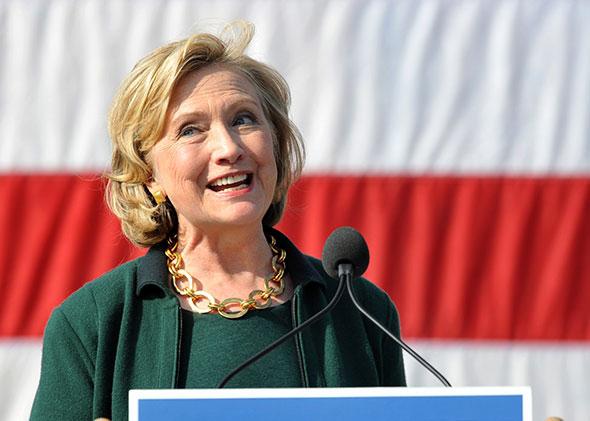DES MOINES, Iowa—Covering the frantic Republican caucus in Iowa while simultaneously covering the drowsy Democratic contest is like stepping off of a moving walkway. You swing your arms and legs at the same quick pace, but you’re not moving fast anymore. The Republican candidates are scrambling for organizers, planning visits, and zooming around the country collecting money, while Hillary Clinton is the most dominant nonincumbent ever. Democrats like Gov. Martin O’Malley and Sen. Bernie Sanders are making moves, but few local activists even pretend that they are serious challengers to Clinton. Ready for Hillary is in the state and organizing all 99 counties, but all of that activity without any real competition is the difference between running in place and running for your life.
Nevertheless, there is a feeling in Iowa that Clinton needs to campaign as if she had a real challenger.
A pause for an important Iowa caveat: Not all the advice coming out of Iowa is driven by what’s best for Hillary Clinton. Activists in the state like to be courted and are used to getting attention. They like the phone calls they can dine out on. They like it when the candidate visits the state because they can raise money off the visit and build their local political networks. So it’s not surprising that Iowa Democratic activists want Clinton in the state early and often.
That’s one reason why Clinton might be tempted to ignore the advice coming out of the state to make a big commitment. The other is that she has a lot of commitments all across the country. She’s got to raise money, and there are perhaps easier places where she can campaign to tighten her message and buff her image. After all, Iowa has the bad memories of the 2008 race, where Barack Obama beat her, and it’s not like she is in danger of losing the caucus.
But the best argument for a strong Clinton campaign in Iowa isn’t based on her being in danger of losing the caucus. The argument for Clinton to play hard in Iowa is rooted in the general election to come. In my time in Iowa, a few Democrats compared Clinton to Bruce Braley, the failed Democratic Senate candidate. The consensus view is that Braley waited too long to present himself, and as a result he was defined by his opponent. Also, as a campaigner, he lacked the ability to make a strong connection with voters. In short, he was late and out of touch. The comparison isn’t entirely fair. Clinton is a better candidate than Braley, but those general critiques are familiar ones that attach to her.
Of course, there are benefits to waiting as long as possible before launching a campaign. A late start diminishes the chance for stumbles and the onset of Clinton fatigue in the electorate. The counterargument is that Clinton needs a sparring partner. She was a better candidate in 2008 after Barack Obama toughened her up. Even those who have her self-interest at heart think that she would benefit from having an opponent. “She would be a much better candidate if she had a challenger,” said one veteran Democratic politician. “It would sharpen her ideas and help her reaction time.” (Since the Democratic field looks so weak at the moment, perhaps a wealthy donor should step in and hire a populist bruiser.) Plus, Republicans are already running against her like she’s an announced candidate anyway. Why let them define her first?
The second reason to run hard is that Iowa is a general-election battleground state. If Clinton looks like she’s willing to fight for the vote now and give Iowans the attention that they have come to expect, they will remember that when she’s fighting for those six electoral votes.
Finally, Iowa is well-designed for the precise kind of personal campaigning Clinton needs to do. The knocks against Clinton are that she thinks she’s owed the presidency and that she has no message other than her inevitability. If she campaigned hard in Iowa, it would show that despite her Olympian position in the polls, she’s willing to fight hard and take no vote for granted. She has grit and isn’t going to duck a state that has been unkind to her in the past, even though that would be easy for her. “It would show people that she was willing to earn it,” says a veteran Democratic strategist who isn’t based in Iowa.
At the moment, Clinton’s image conjures visions of wealth and black SUVs. The frequent fundraising trips she will take will add photos and datelines like New York, Los Angeles, and San Francisco to this storyline. If the general election turns on a conversation about which candidate cares most about the life of the regular voter and the challenges he faces, Clinton needs to show she can participate in that conversation. There’s no better place than a house in Dubuque, Iowa. “When she comes to Iowa she can sit in someone’s living room and talk about her vision for the country,” says Bonnie Campbell, former Iowa Attorney General and a former Democratic gubernatorial candidate. “When people see her personality, they change their mind about her. The more practice she can get, the better.”
